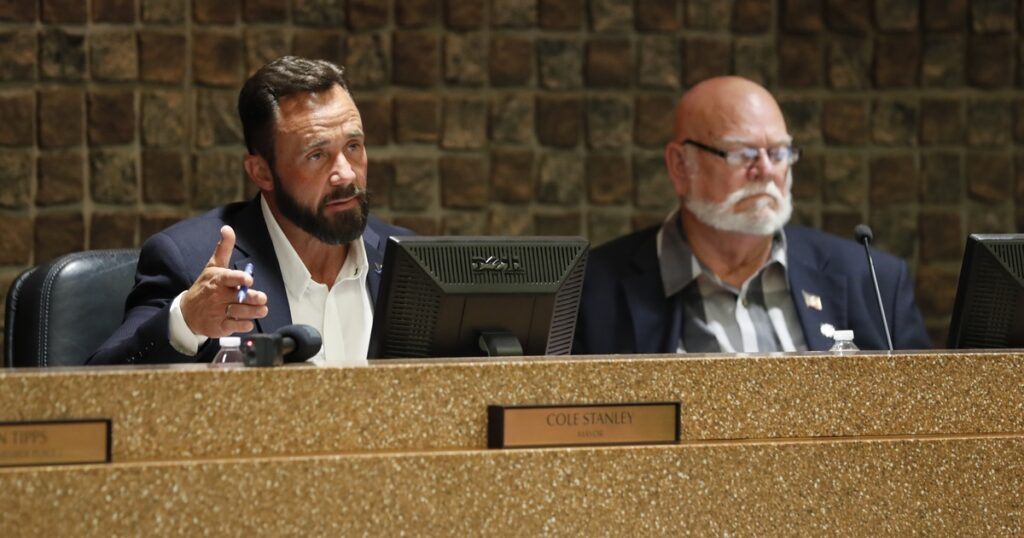Sign up for The Texas Tribune's daily newsletter, “The Brief,” to keep readers up to date on the most important Texas news.
LUBBOCK — The Amarillo City Council on Tuesday refused to immediately approve a voter-approved petition calling for the Texas Panhandle city to adopt a so-called abortion travel ban, again slowing a movement that is spreading to similarly conservative cities and counties.
The City Council has less than a month to decide whether to accept, amend or reject the petition backed by anti-abortion activists. If the council ultimately rejects the petition or significantly amends it, supporters are expected to ask voters for a final decision in November.
The City Council also discussed adopting a separate policy that would mirror 2021's Senate Bill 8, also known as the Heartbeat Bill, which would ban abortions six weeks after a patient's last menstrual period. Doing so would “close a loophole” and define a “fetus” as beginning at the time of conception, Mayor Cole Stanley said.
After hours of public comment and consultation with petition groups, the City Council decided not to act on either policy proposal. The City Council will hold a public hearing on June 11 to discuss amending the ordinance again.
The abortion travel ban proposed in Congress would effectively make it illegal to use local roads and highways to help people get an abortion out of state, a policy that legal scholars and abortion advocates say is unconstitutional.
The city council discussed the proposed amendments to the ordinance with a committee that supported the petition, including residents Jana Mae, John Barrett and Steve Austin. Councilman Don Tipps asked whether parents or grandparents could be exempt from penalties if they violated the law. The committee responded that they could not.
The long-running dispute between the City Council and abortion rights advocates and opponents began last October when the City Council first took up the issue, considering an 18-page ordinance that included a proposed travel ban that would have also banned abortions in Amarillo, even though Texas already has one of the strictest anti-abortion laws in the nation.
The council did not approve the policy at the time, a departure from a trend in other conservative municipalities and counties that passed the policy with little debate. In December, after the council indicated it intended to pass a revised version of the policy that did not include the travel ban, a group of Amarillo residents began circulating a petition.
The legally questionable travel ban is a must-have for anti-abortion activists. With over 203,000 residents, Amarillo is the largest city in the heart of the Texas Panhandle. Interstates 40 and 27 run through the city, both of which connect smaller towns around Amarillo with the rest of the state, Oklahoma, and New Mexico.
Opponents of the proposal have expressed concern that it could drive people away from the city and negatively impact interstate commerce.
Stanley said Tuesday that the council plans to remove the road portion of the ordinance and rewrite a section titled banning abortion trafficking to use state language in the law as part of the proposed amendments. He said enforcement is a weakness in the policy and he wants to remove that section as well. The council said it will need to consult with its legal team on the proposed amendments.
Robin Ganz, a former Amarillo pastor, told the City Council she believes in the sanctity of life, but worries the ordinance could isolate pregnant women from their loved ones during an emotional time in their lives.
“This prevents us from offering basic human kindness, comfort and assistance to someone at a terrible time,” Ganz said.
Gantz also said the enforcement mechanism suggested a “vigilante mentality” and could allow for lawsuits motivated by financial gain.
May, who spearheaded a petition to urge council to pass the ordinance and think about the children, said in situations like this, people only hear about the women and their choices.
“I haven't heard anything about a baby,” May said.
The original bill doesn't offer any penalties for pregnant women who get abortions out of state. Instead, those who “aid and abet” abortions can be sued in civil court by other citizens. That's the only way to enforce the bill, which is similar to a 2021 bill that would ban nearly all abortions. Critics say it's pitting neighbor against neighbor over bounties.
Jonathan Mitchell, an anti-abortion legal activist who helped write the 2021 bill, is working with activists pushing for a travel ban at the city and town level and has filed a legal petition seeking testimony from women who say they traveled out of state for abortions.
Other cities and counties in Texas have also passed ordinances banning people from passing through their jurisdictions for out-of-state abortions, including the cities of Athens, Abilene, Plainview, San Angelo, Odessa, Munster and Little River Academy, as well as Mitchell, Goliad, Lubbock, Dawson, Cochran and Jack counties.
The Texas Tribune Festival, taking place in downtown Austin September 5-7, is a big event packed with events you'll want to attend. Join us for three days of bold conversations about politics, public policy and the news of the day.


